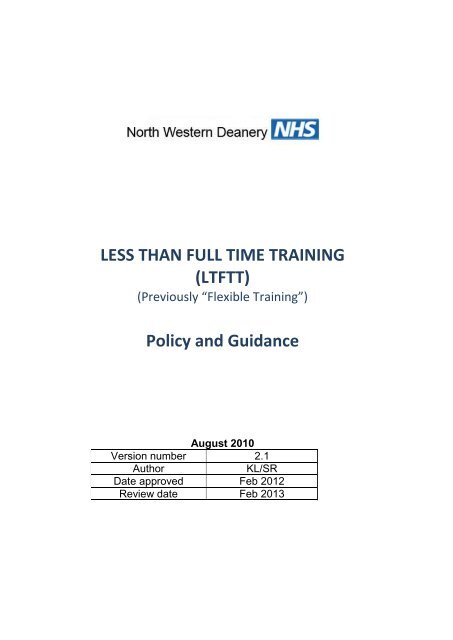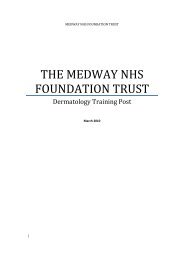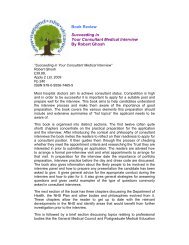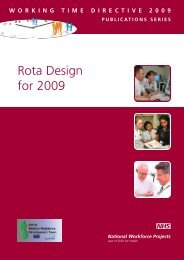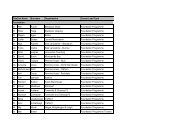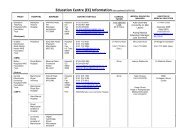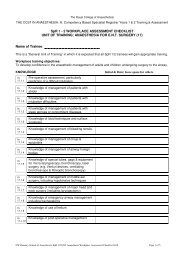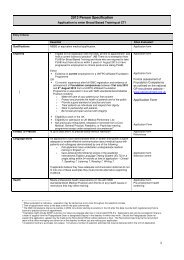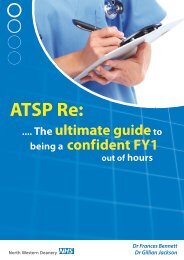LTFTT - North Western Deanery
LTFTT - North Western Deanery
LTFTT - North Western Deanery
You also want an ePaper? Increase the reach of your titles
YUMPU automatically turns print PDFs into web optimized ePapers that Google loves.
LESS THAN FULL TIME TRAINING(<strong>LTFTT</strong>)(Previously “Flexible Training”)Policy and GuidanceAugust 2010Version number 2.1AuthorKL/SRDate approved Feb 2012Review date Feb 2013
Table of contentsTopicPage(s)1. Introduction 32. Scope/ Aim 33. Eligibility 44. Forms of <strong>LTFTT</strong> 5-74.3 Slot-shares 54.4 RHFT 54.5 Supernumerary 64.6 On-Call 6-75. Application procedure 7-95.1 Eligibility screening 75.2 <strong>LTFTT</strong> Post Approval 85.3 Existing LTFT Trainees 85.4 LTFT in General Practice 85.5 LTFT timelines 96. Funding arrangements 9-107. Additional Guidance 11-137.1 Study Leave 117.2 Annual Leave 117.3 LTFT Post approval (GMC) 117.4 Increase of sessions 127.5 Additional employment 127.6 Locum consultant sessions 137.7 Pay Protection 137.8 Fixed Term Speciality Training Appointment (FTSTA) 138. Responsibilities & duties 13-148.1 Trainees 138.2 The <strong>Deanery</strong> 148.3 Trusts 148.4 Training Programme Directors 149. Further resources/ contacts 15-169.1 National Guidance 159.2 Contact lists 15-1610. Appendix 17-27Page 2 of 27
1. Introduction1.1 Less Than Full Time Training (LTFT) is a scheme whereby eligible trainee doctors anddentists of all grades are able to work on a part time basis. Full time training relates toa 40 hour week and for the purposes of the scheme, “part time” means working frombetween 50% and 80% of a full time equivalent.1.2 The term “Less Than Full Time” has replaced “Flexible”.1.3 The <strong>North</strong> <strong>Western</strong> <strong>Deanery</strong> (The “<strong>Deanery</strong>”) manages <strong>LTFTT</strong> for all trainees,including GPSTs in general practice (GP) based placements (and Integrated Posts), inthe <strong>North</strong> West.1.4 General Practice Specialty Trainees (GPSTs) in GP based placements (and Integratedor GP+ Posts): The GP section in the <strong>Deanery</strong> manages <strong>LTFTT</strong> for GP basedplacements and there is a separate <strong>LTFTT</strong> application form for this purpose which canbe found at page 21 of the appendix.2. Scope/ Aim2.1 The Improving Working Lives (IWL) Initiative, NHS Policy 2002, aims to improvedoctors’ working lives by improving their work/ life balance and providing employmentconditions which enable all doctors to work and train in the NHS to their full potential.<strong>LTFTT</strong> is included as one of the IWL standards.2.2 The <strong>Deanery</strong> fully endorses the principles set out in the NHS Employers’ guidancedocument – “Doctors in Flexible Training: Principles underpinning the newarrangements for flexible training”.2.3 The <strong>Deanery</strong> aims to provide a robust provision of <strong>LTFTT</strong>, to promote <strong>LTFTT</strong> and tomanage the <strong>LTFTT</strong> budget in such a way that <strong>LTFTT</strong> is available to as many eligibletrainees as possible.2.4 This policy is non-contractual.Page 3 of 27
3. Eligibility3.1 <strong>LTFTT</strong> is available to doctors and dentists (of either gender) in training who are able topresent well founded reasons as to why full time training is impractical. The eligibilitycriteria are described in European Union Council Directive 93/16-/EEC 1993 andprovisions of the Employment Rights Act (as amended)1996 and its associatedlegislation, and may change from time to time.3.2 There are two eligibility categories:Category 1: Those doctors in training with:- A disability or ill health Caring responsibilities for children up to and including the age of 16 Caring responsibilities for other dependents (for example a spouse or a parent)Category 2: Those doctors in training with:- Unique opportunities for personal/ professional development3.3 Applicants whose circumstances place them into category 1 will always take priorityover category 2 applicants, though the <strong>Deanery</strong> will do its best to accommodate allthose who are eligible.3.4 It should be noted that a trainee has the right to request <strong>LTFTT</strong> and the <strong>Deanery</strong> hasa duty to consider each application positively, there is no right to <strong>LTFTT</strong> in itself.3.5 For information on the eligibility screening process see section 5 of this policy.3.6 AppealsIf the trainee is deemed not to be eligible for <strong>LTFTT</strong> they have a right to appeal thatdecision. They can do this by following the appeals process found in the appendix atpage 18.Page 4 of 27
4. Forms of <strong>LTFTT</strong>4.1 The training programme for a LTFT trainee should contain the same educationalopportunities on a pro-rata basis as that of a full-time trainee, including but not limitedto, out of hours opportunity, audit, research and teaching.4.2 On the 18 th October 2011 the GMC’s Postgraduate Board reinstated a minimum timerequirement of 50% for doctors in specialty training who work on a less than full-timebasis. There will be provision for Postgraduate Deans to further reduce the timerequirement to a minimum of 20% where trainees are experiencing exceptionaldifficulties.There are currently three ways a LTFT trainee can be accommodated within the <strong>North</strong><strong>Western</strong> <strong>Deanery</strong>:4.3 Slot-Shares4.3.1 Slot-shares comprise of two trainees occupying one full time-post with bothtrainees arranging the out of hours component between them. Each trainee ina slot-share works at 60% of their full time counterparts (to both facilitateeffective handover and enable each partner to benefit from the formal teachingprogramme).4.3.2 The <strong>Deanery</strong> part of the <strong>LTFTT</strong> funding for slot-share arrangements is agreedautomatically and there is no separate authorisation needed from the AssociateDean for <strong>LTFTT</strong> funding in the post approval process (see sections 5 & 6). 50%of each basic salary is funded centrally though the education contract, with theremaining 10% funded by the <strong>Deanery</strong>’s <strong>LTFTT</strong> budget.4.3.3 “Slot-sharing” is distinct from “job-sharing” in that it does not restrict thetrainees to work up to a maximum of 50% each for the duration of theircontract.4.4 Reduced hours in a full-time post (RHFT)4.4.1 In a RHFT arrangement the trainee occupies an established full-time post atreduced hours. RHFT arrangements offer the most flexibility as trainees arepermitted to work between 50% and 80% of their full-time equivalents, subjectto trust and specialty agreement. The full-time post is funded through theeducation contract and so no further funding is committed from the <strong>LTFTT</strong>budget.4.4.2 The <strong>LTFTT</strong> Post Approval form must still be completed for a RHFT post.4.4.3 Trusts are entitled to utilise the left over funding for the full-time post (forexample where a trainee is occupying 60% of a post, the trust would have 40%left over) as they see fit. Usually this would be to fund additional cover. It isacceptable if the trainee is willing to fulfil the full-time on-call commitmentproviding the total hours worked do not exceed 40 per week.Page 5 of 27
4.5 Supernumerary4.5.1 Supernumerary placements should only be considered if slot-shares orRHFT placements are not feasible as identifying the necessary fundingfrom the <strong>LTFTT</strong> budget will be subject to financial constraints and maylead to a significant delay in the start of <strong>LTFTT</strong>.4.5.2 Once a substantive post has been secured and the employing trust has agreedto accommodate the trainee, a new supernumerary post is created in additionto the <strong>Deanery</strong> funded full-time training post, which can then be re-filled by thetrust and the relevant school.4.5.3 The basic salary for supernumerary placements is usually wholly funded fromthe <strong>Deanery</strong> <strong>LTFTT</strong> budget, and the host trust pays the out of hourscomponent. Therefore, supernumerary placements place considerably morestrain on the <strong>LTFTT</strong> budget than either of the other forms of <strong>LTFTT</strong>.4.5.4 The relevant Training Programme Director (TPD) must also confirm that thereis capacity within the training programme and host site to support asupernumerary placement – see section 7.3.4.5.5 Trainees in supernumerary funded placements are permitted to work up to amaximum of 60% of their full time counterparts. The only exception to this is fortrainees in their final year of training when by increasing to 70 or 80% there isno additional funding required as the total number of sessions is unchangedand has already been budgeted for. However, in the period of grace this revertsto 60%.4.6 On-call4.6.1 LTFT trainees must do the same amount of on call work pro rata as full- timetrainees as a minimum requirement4.6.2 Additional hours will inevitably vary from specialty to specialty, and also within aspecialty, and even for the same level within a specialty across different trusts;this does not affect CCT dates.4.6.3 If willing, LTFT Trainees are permitted to carry out full time on-call as long asthe total hours worked per week (basic plus on-call) does not exceed 40 hours.(The maximum to qualify as LTFT – i.e. 80% of 48 hours); this does not affectCCT dates. As with all <strong>LTFTT</strong> placements, the banding is calculatedindividually and is likely to be more than the full-time equivalent.4.6.4 If a LTFT trainee wishes to reduce their on call work so it remains pro rata asfor full-time trainees (as a consequence of the 48 hour week) they can do so,but may risk a change to their banding and therefore a reduction in income.4.6.5 If a LTFT trainee wishes to maintain their on call work at the same level theycan do so (and in fact if willing can increase their on call work up to full timeproviding total hours worked do not exceed 40 as described in 4.6.3) but thiswill not affect CCT date.Page 6 of 27
4.6.6 LTFT trainees are permitted, if willing, to carry out additional on-callresponsibilities within the host trust to cover unexpected short-term gaps in therota, e.g. to cover sickness. It is not permissible for planned absences.4.6.7 In some specialties trainees are permitted to train for one year with no on-callresponsibilities.5. Application procedure5.1 Eligibility screening5.1.1 Once the trainee has decided they wish to apply for <strong>LTFTT</strong>, they need to havetheir eligibility assessed against the standard eligibility criteria as set out insection 3 of this policy.5.1.2 A trainee can have their eligibility screened for the scheme by submitting anonline eligibility screening form which can be accessed athttps://www.nwpgmd.nhs.uk/content/less-full-time-training5.1.3 Following submission of the eligibility screening form, the trainee’s eligibility isassessed by the Associate Dean with responsibility for <strong>LTFTT</strong>.5.1.4 If the trainee is deemed not to be eligible they have the right to appeal as persection 3.6 above. If the trainee is deemed to be eligible a confirmation ofeligibility letter and a <strong>LTFTT</strong> post approval pack will be sent to them. The<strong>LTFTT</strong> post approval pack comprises of the <strong>LTFTT</strong> Post Approval form and anassociated step by step guide, copies of which can be found in the appendix.5.1.5 Usually, trainees will be informed of the Associate Dean’s decision within twoworking weeks of submitting their application form.5.1.6 Please note that the time period set out in section 5.1.5 may be extendedwhere a trainee is applying on the grounds of disability or ill health wherefurther investigations are required, for example where occupational healthscreening is required.5.1.7 There may be occasions where the Associate Dean for <strong>LTFTT</strong> wishes tointerview a trainee who has applied for <strong>LTFTT</strong>.5.2 <strong>LTFTT</strong> Post Approval Form5.2.1 For detailed guidance on how the <strong>LTFTT</strong> Post Approval form should becompleted please see the associated guidance document – “Less Than FullTime Training Placement Arrangement Guide”, a copy of which can be found inthe appendix of this policy at page 20.5.2.2 If the only way a trainee can be accommodated is as a supernumerary trainee,the authorisation of <strong>Deanery</strong> funding may be delayed by budgetary constraintsand the trainee placed on a waiting list until it becomes available. This is timebased as Trainees have to request approval for each placement therefore atrainee may not receive the funding for each placementPage 7 of 27
5.2.3 If a trainee is placed on a waiting list they will be kept up to date regarding theprogress of funding authorisation.5.2.4 The <strong>LTFTT</strong> Post Approval form must be completed before the trainee starts inpost. Failure to do so could lead to adverse consequences such as nonrecognition of training time or being paid incorrectly.5.3 Existing LTFT Trainees5.3.1 Existing LTFT trainees who are rotating into placements in a different trustmust complete a new <strong>LTFTT</strong> Post Approval form to confirm that the new trustmedical staffing and finance departments are happy with the plannedarrangements. Training Programme Directors should discuss rotations andcomplete the form with the trainee in a timely manner.5.3.2 For the avoidance of doubt, section 5.3.1 is applicable whether the trainee issupernumerary, RHFT or in a slot-share as all of these arrangements will havea staffing impact, a financial impact, or both.5.3.3 When planning the rotation of a supernumerary LTFT trainee it should beconsidered whether their form of <strong>LTFTT</strong> should change, i.e. can they be movedinto a slot-share or a RHFT. Every effort should be made to accommodatetrainees in slot-shares or RHFT posts.5.4 <strong>LTFTT</strong> in General Practice5.4.1 For all full-time hospital placements GPSTs are no different from other specialtytrainees. As the programme rotates in and out of GP and hospital placementsthe Training Programme Director is responsible for managing the completion ofthe necessary paperwork in conjunction with the Trainee.However, <strong>LTFTT</strong> for the GPST in general practice based placements (includingIntegrated Training Posts (ITPs) or GP+ posts) is arranged through the GPsection in the <strong>Deanery</strong>.Page 8 of 27
5.5 <strong>LTFTT</strong> application and arrangement timelines5.5.1 Eligibility screening applications may be submitted at any time. Traineesapplying for eligibility under the child care heading may apply as soon as theyknow they are pregnant. Any trainees applying before they give birth (and whoare not otherwise eligible) will be deemed to be eligible pending the birth oftheir child, and the confirmation letter will have wording to that effect.5.5.2 The process of completing the <strong>LTFTT</strong> Post Approval form should be initiated atleast three months before the trainee is hoping to start as a LTFT trainee or isdue to rotate into a new trust.5.5.3 If the trainee starts as a LTFT trainee before the <strong>LTFTT</strong> Post approval form hasbeen fully completed then there are likely to be adverse consequences, suchas non recognition of training time or being paid incorrectly.6. Funding arrangements6.1 Generally, the <strong>Deanery</strong> will pay the basic salary of LTFT trainees – either via theeducation contracts or directly from the <strong>LTFTT</strong> budget (depending on which form of<strong>LTFTT</strong>), and the trust will pay the out of hours component.6.2 The method for calculating pay for LTFT trainees can be found in national guidancefrom NHS Employers, entitled “Equitable Pay for flexible medical training, 2005”. Thesystem for paying LTFT trainees is one where the basic salary is determined by theactual hours of work, as derived initially from the rota and confirmed by subsequentmonitoring.6.3 A division into four-hour bands based on hours of actual work enables some averagingto take place, and the pay for each band is based on the lower hours limit. N.B. 60%does not equate to F6 as the hours on call per week must be added.Thus:F5 is 20 or more and less than 24 hours of actual work a week and attracts 0.5F6 is 24 or more and less than 28 hours of actual work a week and attracts 0.6F7 is 28 or more and less than 32 hours of actual work a week and attracts 0.7F8 is 32 or more and less than 36 hours of actual work a week and attracts 0.8F9 is 36 or more and less than 40 hours of actual work a week and attracts 0.9of the fulltimebasicsalary6.4 Added to this is a supplement, paid as a proportion of the basic salary identified aboveto reflect the intensity of the duties.0.5Total salary = salary* + salary* x 0.40.2*salary = F5 to F9 calculated as above6.5 The supplements will be applied on the basis as set out below: Band FA – trainees working at high intensity and at the most unsocial times Band FB – trainees working at less intensity at less unsocial times Band FC – all other trainees with duties outside the period 8am to 7pm Monday toFridayPage 9 of 27
7. Additional guidance7.1 Study LeaveBandSupplement payable asa proportion of thecalculated basicFA 50%FB 40%FC 20%7.1.1 LTFT trainees are entitled to periods of study leave with funding pro-rata oftheir sessional commitments. For example, a trainee working at six sessionsper week will be entitled to 60% of the equivalent full time study leave fundingper year, subject to 7.1.2 below.7.1.2 At the discretion of the study leave budget holder, LTFT trainees may bepermitted to receive additional study leave funding to undertake necessarycourses.7.2 Annual Leave7.2.1 Annual leave and bank holiday entitlement for LTFT trainees is generallycalculated on a pro-rata basis. Employers may have additional policies in thisregard.7.3 LTFT post approval (GMC)7.3.1 Supernumerary <strong>LTFTT</strong> posts only need to be separately approved by -GMC ifthe addition of a supernumerary post would cause the approved trainingcapacity in that specialty to be exceeded.7.3.2 If the addition of a supernumerary placement would cause the approvedtraining capacity in the specialty to be exceeded then the relevant trainingprogramme director should inform the <strong>Deanery</strong> who will need to apply for theincrease to be approved by submitting an updated Form A to -GMC.Page 10 of 27
7.4 Increase of sessions7.4.1 LTFT trainees who are in RHFT posts have the greatest flexibility in terms ofthe number of sessions they can work per week. RHFT trainees can workbetween 50% and 80% of their full time equivalents. Increases to the initialagreed level can be negotiated with the <strong>Deanery</strong>, the trainee and the employer,taking into account training and service needs.7.4.2 LTFT trainees who are in slot-shares are generally only permitted to work upto a maximum of 60% each. In the case of one slot share partner leaving thearrangement (for example a period of maternity leave) the remaining partnerwill usually be treated as a RHFT trainee and has the flexibility described insub-section 7.4.1. If the slot-share is re-established, both trainees will revert to60% each.7.4.3 LTFT trainees who are in supernumerary posts are permitted to work up to amaximum of 60% with no scope to increase beyond, subject to 7.4.4. below.7.4.4 If the supernumerary trainee is in the final year of their training and is due tofinish their training within the current financial year, they are permitted toincrease sessions up to 80%, subject to agreement from the trust, specialtyand <strong>Deanery</strong>.7.4.5 If the LTFT trainee wishes to increase the number of sessions they work thenthey should contact the <strong>LTFTT</strong> Administrator at the <strong>Deanery</strong> to request thenecessary form.7.5 Additional employment7.5.1 LTFT trainees are not permitted to undertake any additional employment,either within or out of the NHS, to their LTFT training posts.7.5.2 Sub-section 7.5.1 may be waived from time to time in respect ofcertain initiatives that may present additional opportunities for LTFT trainees –for example Medical Education Fellow posts. All queries regardingopportunities such as the above must involve consultation with the AssociateDean with responsibility for LTFT training before commencement.7.5.3 If there is a requirement in the LTFT trainee’s department to work anoccasional extra shift at short notice due to unforeseen circumstances then thetrainee is encouraged to assist their fellow team members. This does notinclude situations where there are planned absences such as annual leave.7.5.4 A further exception to sub-section 7.5.1 may be found in section 7.6 below.Page 11 of 27
7.6 Locum consultant sessions7.6.1 Trainees in their final year of training have the opportunity to “act-up” as alocum consultant providing that it is under supervision, meets the requirementsof the curriculum and is limited to three months whole time equivalent. It alsorequires agreement of the training programme director, the trust and the<strong>Deanery</strong>.7.7 Pay protection7.7.1 Pay protection for LTFT trainees only extends to placements that were fixed atthe time the trainee initially entered the training programme.7.8.1 Fixed Term Specialty Training Appointment (FTSTA)7.8.1 FTSTA posts are up to one year fixed-term appointments. Those doctorsappointed to FTSTAs will not be allocated a National Training Number (NTN)and will be placed for the fixed amount of time regardless of working fulltime orless than full time.8. Responsibilities and duties8.1 Trainees8.1.1 Trainees should understand that <strong>LTFTT</strong> is not an automatic right and itsavailability is governed by finite resources.8.1.2 When applying for <strong>LTFTT</strong>, trainees must ensure all information used in supportof their application is accurate and is not in any way misleading. The <strong>Deanery</strong>reserves the right to cross-check all information entered on to eligibilityscreening forms.8.1.3 Trainees should not dictate the terms and conditions of their <strong>LTFTT</strong>placements to trusts. The process is one of negotiation between all relevantparties. The requirements of the relevant curriculum have to be met on a proratabasis.8.1.4 Trainees are not permitted to carry out any additional employment not coveredby sections 7.5 and 7.6 above.8.1.5 Trainees must ensure that the <strong>LTFTT</strong> post approval form is completed in goodtime before the planned start date. It is the trainee’s responsibility to raiseconcerns about the progress of an application with the relevant parties.8.1.6 Existing <strong>LTFTT</strong> trainees must ensure that a new <strong>LTFTT</strong> Post Approval form iscompleted for planned rotations where there is a move between trusts workingin conjunction with the Training programme Director.8.1.7 Trainees should notify the <strong>Deanery</strong> (and other relevant parties) when there is achange in circumstances relating to:8.1.7.1 The planned start date8.1.7.2 Their eligibility8.1.7.3 A proposed change to their <strong>LTFTT</strong> arrangementsPage 12 of 27
8.2 The <strong>Deanery</strong>8.1.7.4 The Trust they are working at (i.e. rotations)8.1.7.5 Resignation from the training programme8.2.1 The <strong>Deanery</strong> will treat all <strong>LTFTT</strong> applicants, who meet the eligibility criteria,equally, regardless of race, gender, age, disability, religion or belief, sexualorientation or any other discriminatory factor.8.2.2 The <strong>Deanery</strong> is responsible for ensuring that all <strong>LTFTT</strong> of any kind isundertaken in posts and programmes that have been prospectively approvedby GMC.8.2.3 The <strong>Deanery</strong> will manage the <strong>LTFTT</strong> system in such a way that informationpertaining to a LTFT trainee (application information or otherwise) flowsbetween all relevant parties. “Relevant parties” includes, but may not be limitedto; the Trainee, Training Programme Directors, Lead employer personnel, truststaffing officers, finance officers and sections of the <strong>Deanery</strong>.8.2.4 The <strong>Deanery</strong> is committed to enabling as many eligible <strong>LTFTT</strong> applicants aspossible to train on a LTFT basis. This includes promoting the mainstreamingof <strong>LTFTT</strong> and ensuring that supernumerary placements are arranged only as alast resort.8.2.5 The <strong>Deanery</strong> will endeavour to adapt its policy from time to time to reflectchanges in national guidance and/or legislative changes relating to <strong>LTFTT</strong> orpart-time working in general. Changes to <strong>LTFTT</strong> policy will be communicated toall relevant parties in good time.8.3 Trusts8.3.1 Trusts are expected to treat LTFT trainees no differently from full-time trainees,and in accordance with the policies and procedures of the lead employers.8.4 The Training programme8.4.2 The responsibilities of training programme directors and educationalsupervisors (or college tutors/ specialty leads) for LTFT trainees are nodifferent to full-time trainees except for the additional requirements described inthe “LTFT Placement Arrangement Guide” which can be found in the appendixat page 21. This includes annual training assessments (nb. Assessmentsshould not be carried out pro-rata for LTFT trainees). Guidelines for GPST areunder review and subject to GMC scrutiny.Page 13 of 27
9. Further resources/ contacts9.1 National guidance9.1.1 NHS Employers have published two guides to <strong>LTFTT</strong> which can bedownloaded from:http://www.nhsemployers.org/PayAndContracts/MedicalandDentalContracts/JuniorDoctorsDentistsGPReg/Pages/DoctorsInTraining-FlexibleMedicalTraining.aspx9.1.2 For statistical information about <strong>LTFTT</strong> provision in the United Kingdom pleasefollow the following link to the Yorkshire & Humber <strong>Deanery</strong>’s website:http://www.yorksandhumberdeanery.nhs.uk/the_deanery/lead_dean/ltft_forum.aspx9.2 Contacts9.2.1 <strong>Deanery</strong> contactsName Position Email addressDr ShirleyRemingtonAssociate Dean<strong>LTFTT</strong> AdministratorS.Remington@nwpgmd.nhs.ukLTFT@nwpgmd.nhs.ukSally Howorth Primary Care Manager S.Howorth@nwpgmd.nhs.uk9.2.2 LTFT Trainee representativeName Position Email addressDr Laura Freedman LTFT Trainee rep. drlouisefreedman@googlemail.comPage 14 of 27
9.3.2 LTFT Advisers (Medical consultants)Name Specialty Email addressDr Maryna Lewinski Radiology Maryna.Lewinski@Stockport.nhs.ukDr Gill Cook Geriatric Medicine Gill.Cook@mbht.nhs.ukDr Bim Williams Obstetrics &Bim.Williams@boltonft.nhs.ukGynaecologyDr Sophie Harrison Palliative Medicine Sophie.Harrison@uhsm.nhs.ukDr Rosalind Green Respiratory Medicine Rosalind.Green@elht.nhs.ukDr Alison Jobling Paediatrics Alison.Jobling@Stockport.nhs.ukDr Santhi Kumar Histopathology Santhi.kumar@elht.nhs.ukMrs Sarah Duff Surgery Sarah.Duff@UHSM.NHS.UKDr Amanda General AdultAmanda.Poynton@mhsc.nhs.ukPoyntonPsychiatryDr Jo Rogers Intensive Care Jo.Rogers@UHSM.NHS.UKMedicineDr Fiona Saunders Emergency Medicine Fiona.Saunders@UHSM.NHS.UKDr Karen Kinder Anaesthetics Karen.Kinder@lthtr.nhs.uk9.3.3 Medical staffing LTFT representativesName Trust Email addressIan Bithell 5 Boroughs Partnership ian.bithell@5bp.nhs.ukChris Whittam Bolton Chris.Whittam@boltonft.nhs.ukChristies Hospital NHS Medical.Staffing@christie.nhs.ukTrustJames Framton Central Manchester James.Framton@cmft.nhs.ukFoundation TrustVicky Shaw Lancashire Care Vicky.Shaw@lancashirecare.nhs.ukPauline Knight Lancashire Teaching Pauline.knight@lthtr.nhs..ukEmma Cain Manchester Mental Health Emma.cain@mhsc.nhs.ukLindsay Welsby Pennine Acute Lindsay.welsby@pat.nhs.ukJoanna Davies Salford Joanna.Davies@srft.nhs.ukKerry Owen Trafford Kerry.owen@trafford.nhs.ukLynne RodenHelen NormanGertie Nic PhilibWrightington, Wigan &LeighUniversity Hospital ofSouth Manchester NHSFoundation TrustTameside Hospital NHSFoundation TrustLynne.roden@wwl.nhs.ukHelen.Norman@UHSM.nhs.ukGertie.Nicphilib@tgh.nhs.ukPage 15 of 27
10. Appendix10.1 Eligibility screening form (online) p1710.2 E-Approval Form p18 - 1910.3 Placement Arrangement Guide p2010.4 Appeals process p21 - 2310.5 GPST <strong>LTFTT</strong> application form p23 - 27Page 16 of 27
10.1 Eligibility Screening FormNameTraining GradeDateSpecialtyPlease state your reasons for wanting to train on aLTFT basis:When do you hope to start as a LTFT trainee?Please indicate which eligibility criteria you satisfy (please tick):Category 1:Category 2:Disability/Ill HealthResponsibility for ChildrenCaring for a DependentIf you have indicated that you have a responsibilityfor children please enter your child(ren)'s age(s) :Professional DevelopmentService to Wider NHSResearchHow did you find out about the LTFT trainingscheme?Address:Telephone Number:Email Address:By sending this form I confirm that the information given is correct and complete to the best ofmy knowledge. I understand that any false or misleading statements may be sufficient groundsfor terminating any arrangements made.Page 17 of 27
10.2 E-Approval Form1. TraineeName:Address:Specialty:Grade:Email address:My circumstances from when I applied for Less than full time training have not changed and I am still eligible totrain less than full time.Are you on a Tier 2 Visa? Yes NoSigned:Date:(by checking this box you are confirming that the information in this section is accurate)The LTFT placement should now be discussed with your Training Programme Director. Please refer toStep 2 of the attached Step by Step Guide2. Training Programme DirectorName:Email address:Please indicate which form of Less Than Full Time training this placement will take byselecting from the drop-down box here:If Slot-Share please provide the name of the Slot-Share partner:If Supernumerary –Please provide reasons why Supernumerary funding is requiredand advise if the addition of a Supernumerary trainee will exceed the approvedtraining capacity?If supernumerary funding is the only option then this form must be emailed to the <strong>LTFTT</strong>raining Administrator, LTFT@nwpgmd.nhs.uk, to ensure that funding is available,before progression to step 3. If funding is available then box 5 will be signed and theform returned to you. If funding is not available then you will be informed as to when itis likely to become available.If Reduced Hours in a Full Time Slot – please advise the number of hoursDate new placement starts:Trust where trainee will be workingPlease note any special considerations, pertinent to the trainee, For Example - no nights forhealth reasonsSigned:Date:(by checking this box you are confirming that the information in this section is accurate)Page 18 of 27
Steps 3-5 of the step by step placement arrangement guide must now be completed. When agreementhas been reached regarding your placement then please email this form to the Educational Supervisor/College Tutor (for GP this the form needs to be signed by the Clinical Supervisor in the hospitalTrust) for signing below.3. Educational Supervisor (for GP this the form needs to be signed by the Clinical Supervisorin the hospital Trust)Name:Email address:I confirm that the Clinical Director and Trust are agreeable to this LTFT placementSigned:Date:(by checking this box you are confirming that the statement above is correct)The educational supervisor/ college tutor should now email the form to the Trust staffing and financedepartments to sign the box below4. Trusta) Medical StaffingBy checking the signature box below I confirm that the requirements for the trainee tocommence in a LTFT placement, which may include a banding supplement, have beenapprovedName: Signed: Date: Payband:Email address:b) Finance DirectorBy checking the signature box below I confirm that funding has been approved for theassociated costs of this placementName: Signed: Date:Email address:Please email this form after completion of Step 4 (or after completion of step 2 if Supernumerary) to:LTFT@nwpgmd.nhs.uk5. <strong>Deanery</strong>By checking the signature box below I confirm that <strong>Deanery</strong> funding has been approved forthis supernumerary LTFT training scheme placementName: Signed: Date:Page 19 of 27
10.3 Placement Arrangement GuideLess Than Full Time Training Placement Arrangement GuideThe following is a guide outlining the steps that must be taken in order to arrange a Less thanFull Time (LTFT) Training placement1. Trainee informs the Training Programme Director (TPD) that eligibility for LTFT training hasbeen confirmed and indicates when they hope their LTFT training can commence.2. Trainee discusses with the TPD possible placements at least three months in advance todetermine which form of LTFT Training can be arranged (i.e. supernumerary, slot-share orreduced hours in a full time post), and to identify an educational supervisor (ES), or CollegeTutor where appropriate.If only a supernumerary placement is feasible then the, <strong>LTFTT</strong> Administrator, must be informed todetermine whether funding will be available before progression to the next step. Section 2 of the e-approval form stating the reason why Supernumerary funding is required needs to be completed andreturned to the LTFT administrator. The information will be considered by the <strong>LTFTT</strong> Associate Deanand a response will be sent to the TPD and Trainee.If the addition of a supernumerary trainee to the programme would exceed approved trainingcapacity then the <strong>Deanery</strong> will need to apply for the increase to be approved through submitting anupdated Form A to GMC, signed by the Postgraduate Dean and the relevant Training ProgrammeDirector3. The TPD will then contact the Educational Supervisor to confirm their acceptance of a <strong>LTFTT</strong>placement and forward the e-approval form.4. The Educational Supervisor will first seek approval from the clinical director and then thetrust’s medical staffing and finance departments.5. Medical staffing and finance departments’ support must be confirmed as there will be staffingand financial implications.6. If the proposed placement has not been accepted then the TPD will consider alternativeplacements.7. The completed form must then be sent to the <strong>LTFTT</strong> Administrator as soon as possible.For all subsequent placements steps 2-7 must be followed and a new LTFT Training approval formcompleted.Please contact the LTFT administrator, LTFT@nwpgmd.nhs.uk for further informationor for LTFT, all non hospital General Practice LTFT post applications please contactSally Howorth, S.Howorth@nwpgmd.nhs.ukPage 20 of 27
10.4 Appeals processScopeA trainee who has applied for Less Than Full Time Training (<strong>LTFTT</strong>) and has beendeemed ineligible for the scheme can appeal that decision by following this appealsprocess.Issues with the employing trust (or equivalent body) relating to salary, provision of outof hours in excess of those required for educational approval or an employers refusalto host a LTFT trainee on cost grounds, should be addressed in accordance with thepolicies and procedures of the lead employer.Notification of AppealOnce the trainee has received the letter confirming their ineligibility from the AssociateDean, and they wish to appeal that decision, they must first contact the <strong>LTFTT</strong>Administrator (within 7 working days of the date of the aforementioned letter) who willprovide a Notification of Appeal form and a copy of this appeals process.The Notification of Appeal form should then be submitted to the <strong>LTFTT</strong> administratorwithin 21 working days of receipt.Appeals processStage 1Once the trainee’s Notification of Appeal form has been submitted, a meeting will bearranged to be held within 14 working days.The stage 1 meeting will involve: The trainee The trainee’s representative The Associate Dean with responsibility for <strong>LTFTT</strong> An independent note takerThe trainee is permitted to be accompanied by a representative which may be; afriend, a representative of the relevant professional body or a work colleague. Legalrepresentation is not permitted.The stage 1 meeting will be informal and its aim is to provide an environment for bothparties to air their views and reach an amicable conclusion.If in concluding the stage 1 meeting there is an agreed outcome, this outcome will beconfirmed by letter to the trainee within 3 working days of the meeting.If there is no agreed outcome then the process moves on to stage 2.Page 21 of 27
Stage 2If in conclusion of stage 1 there is no agreement between the parties then the traineemust confirm by letter that they wish to continue the appeal, addressed to theAssociate Dean, and within 7 working days of the stage 1 meeting.Upon receipt of this letter an appeal hearing will be arranged to take place within afurther 30 working days and confirmed with the trainee. This appeal hearing will be ledby the Postgraduate Dean or a nominated representative.The trainee and the Associate Dean must submit a Statement of Case to thePostgraduate Dean no later than 14 working days prior to the date of the hearing. TheStatement of Case should include: The reason for the appeal A simple list of events in chronological order Copies of all relevant correspondence and written evidence Details of any accompanying representativesThe appeal hearing will be a meeting between the trainee, the trainee’s representative(if applicable), the Associate Dean and the appeal hearing panel, and is an opportunityfor both parties to communicate their views and the panel to reach an equitabledecision. Further information not included in the statements of case is also permittedto be discussed, provided the panel has had adequate time to review it.The appeal hearing panel comprises of: The Postgraduate Dean (or a nominated representative) A representative from the NHS employer, nominated by the chief executive (thiswould normally be a member of Human Resources) A trainee representative A lay representativeThe decision of the panel, and the reasons for making that decision, will normally beannounced at the end of the hearing and will be confirmed to both parties by letterwithin 7 working days. If, for any reason, a decision cannot be made at that time, it willbe communicated to both parties as soon as possible, and within 14 working days.The decision of the panel is final.Page 22 of 27
10.5 LESS THAN FULL TIME TRAINING (<strong>LTFTT</strong>) APPLICATION FORMDepartment of Postgraduate General Practice EducationYou should complete this form if you wish to train on a less than full time basis forposts in a GP Specialty Training Programme only – you will also need to applyseparately for funding if you are in a hospital-based post.For any queries please contact Sally Howorth, Primary Care ManagerS.Howorth@nwpgmd.nhs.ukAll doctors are able to apply for less than full-time training. LTFT training in the NW<strong>Deanery</strong> is currently limited to those doctors in training who are unable to work or trainfull-time because they are:1. disabled or in ill-health (this may include those on in vitro fertility programmes);2. caring for an ill/disabled partner, relative or other dependent;3. personally providing care for young children.4. undertaking an Academic fellowship during trainingPlease refer to full guidelines on <strong>LTFTT</strong> on the <strong>Deanery</strong> WebsiteTRAINEE DETAILSSurname:Home Address:Other name(s):Telephone:Email Address:Intended start date for LTFT Training:Preferred Percentage of Full Time*:Name of Educational SupervisorName and address of GP Training Practice*50% of full-time is the minimum that can be worked.(Essential requirement)Date of appointment to GPST ProgrammeName and year of programmeExpected date of completion of GP Specialty TrainingPosts completed as part of GPST Programme:Specialty Start Date Finish DatePage 23 of 27
Current post:Specialty Start Date Finish DateMy reasons for requesting <strong>LTFTT</strong> are:Start and End Dates of <strong>LTFTT</strong> period are:Educational Supervisors/Programme Directors commentsSigned: …………………………………………… Date: ………………………Name:Page 24 of 27
I hereby formally apply for Less Than Full Time TrainingPlease provide a covering letter with your application explaining in which category youwould be eligible, and giving brief reasons for this.You will also need to provide a timetable, agreed with your GP educational supervisor,which complies with the guidance in the attached calculator.Less Than Full Time Training is not currently offered to enable doctors in training to pursueresearch; other professional activities; courses of study (other than formal appointment toan Academic Fellowship); personal development needs or other employment paid orotherwise.I confirm that:This application is only for GP post(s) in the GP Specialty Training ProgrammeI accept that I may be asked to verify any of the information supplied above.I have discussed this with my GP Educational Supervisor and Programme DirectorI will notify the NW <strong>Deanery</strong> of changes to my circumstances that affect my eligibilityfor flexible training.Signed ………………………………………………………..………………………………………DateGP Specialty TraineeTo be completed by Programme Director:I can confirm that I have discussed this request with the GP trainee and Educational SupervisorSigned………………………………………………………………………………………………..GP Programme DirectorDateTo be completed by Head of GP Specialty Training School:I hereby approve the above trainee’s application for LTFT TrainingSigned………………………………………………………………………………………………..Head of GPST SchoolDatePage 25 of 27
GP SPECIALTY TRAINEE TIMETABLEOne timetable is needed for each post in GPTraining PracticeGP Specialty Trainee NameGP Educational Supervisor NameStart date of LTFT periodEnd date of LTFT period……………………………………………………………………………………………………………………………………………………………………………………………….……………………………….Time Monday Tuesday Wednesday Thursday FridayAMPMGP Educational Supervisor Signature………………………………………….Date………………………………………….Page 26 of 27
LESS THAN FULLTIME TRAINING FOR GP SPECIALTY TRAINEES%Months left to complete full-time (equivalent part-time)sessionsper week 12 11 10 9 8 7 6 5 4 3 2 150% 5 24.00 22.00 20.00 18.00 16.00 14.00 12.00 10.00 8.00 6.00 4.00 2.0060% 6 20.00 18.33 16.67 15.00 13.33 11.67 10.00 8.33 6.67 5.00 3.33 1.6770% 7 17.14 15.71 14.29 12.86 11.43 10.00 8.57 7.14 5.71 4.29 2.86 1.4380% 8 15.00 13.75 12.50 11.25 10.00 8.75 7.50 6.25 5.00 3.75 2.50 1.2590% 9 13.33 12.22 11.11 10.00 8.89 7.78 6.67 5.56 4.44 3.33 2.22 1.11100% 10 12.00 11.00 10.00 9.00 8.00 7.00 6.00 5.00 4.00 3.00 2.00 1.00The highlighted figures refer to the length of time that is needed to be done flexibly to make up the year.10 sessions per week is the maximum. The number of sessions worked part-time, calculated as a percentage of full-time, should ensure that thebalance of service contact, and educational time remains the same as full-time.To work out the ending date, work out how many months are left to complete the year (or longer for those GP trainees doing a longer period ingeneral practice) at full-time, in the top row, and then read off the equivalent number of sessions below, according to the appropriate percent parttime.E.g. A GP trainee has done 6 months full-time and comes back after maternity leave and wishes to do the rest of her time at 70%. She wouldhave 6 months full-time left and at 70% (7 sessions per week) she would need to work for just over 8.5 months.The total session should provide a balance of service and education as appropriate. It will be easier to run sessions together on different weeks tomake up fractions. (eg. at 50% 1 4hr tutorial every 2 weeks). The total number of sessions for each category, done over the whole period of thetraining should be the same, whether done at full or part-time.Service Tutorial GPST LTFT educational time OOH100% 7 1 1 1 12 x 6hrs sessions as a normal minimum in the year. Any90% 6.3 0.9 0.9 0.980% 5.6 0.8 0.8 0.870% 4.9 0.7 0.7 0.760% 4.2 0.6 0.6 0.650% 3.5 0.5 0.5 0.5variation to this to be negotiated with GP educational supervisorand related to development of appropriate competenciesLEAVE. All doctors will be eligible for 5 weeks a year annual leave (taken pro-rata according to the degree of part-time working). In addition, 30 daysstudy leave can be taken, though the educational programme will contribute to this, which will normally amount to 15 days. In addition, 2 weeks only ofunplanned leave (e.g. sickness leave) can be taken without the need to make the time up. Any additional time taken beyond 2 weeks will need anextension of the planned finishing date.Page 27 of 27


